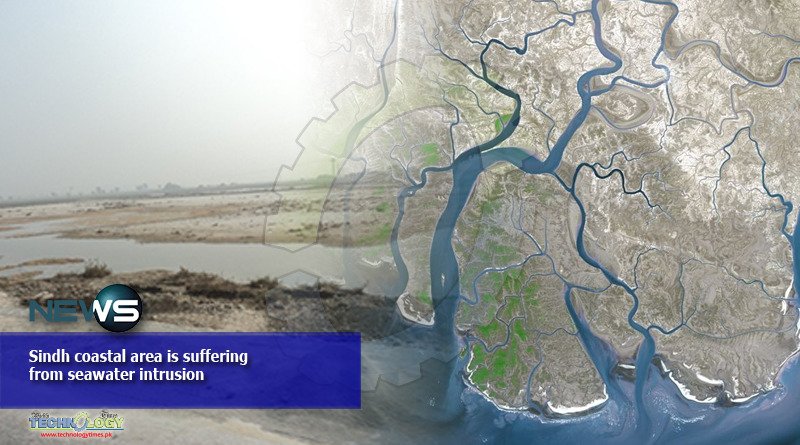Seawater intrusion is occurring at an alarming rate of 80 acres per day in Sindh province coastline. Many factors from freshwater exploitation to degradation of mangroves forest have caused this, which is affecting socio-economic development of the area.

According to a research study, “Seawater Intrusion: Land Degradation and Food Insecurity Among Coastal Communities of Sindh, Pakistan”, the district Badin in Sindh province facing infrastructural damages, socio-economic losses, and food insecurity caused by intrusion of seawater.
Sujawal and Tahtta districts also have severely been affected by seawater intrusion, but at Badin district the agricultural lands are largely affected.
The Senate Standing Committee on Science and Technology had already forecasted that this intrusion in Badin and Thatta, and Karachi coastline may sink them in 30 and 60 years, respectively.
The previous studies are evident that the agricultural lands have poorly been affected due to the enhanced intrusion of seawater that has not only turned cultivated lands into barren, but severely invaded on food grain crops in the region.
Scientists have measured that due to construction of dams and reservoirs at upstream, Indus River reduced to throw silt in sea from 400 million tones to 100 million tones every year. This depletion in flow of silt to sea has accelerated intrusion of seawater.
There are reports that the sea has intruded from 30 to 50 km deep in some coastal areas of Sindh province. According to a survey carried by the Sindh Coastal Development Authority in 2011, in Badin district about 35,785 acres were fully eroded by seawater, where an area of 44,046 acres were partially affected.
According to another study carried in 2001 by Government of Pakistan, it has been estimated that about 0.5 Mha of fertile agricultural land of the Indus delta, or about 12% of the total cultivated land of the entire Sindh province are degraded due to sea intrusion.
It is estimated that an area of about 80 acres of delta per day is being degraded due to seawater intrusion.
This sea intrusion is also causing the degradation of natural resources like, land, livestock, vegetation, fish, mangroves, and other edible marine varieties in the sea. Thus, making local communities more vulnerable to socio-economic disasters.
Moreover, seawater intrusion has affected water quality of the Badin district and increased incidences of waterborne diseases such as malaria, cholera, bacterial diarrhea, etc.
Many factors from freshwater exploitation due to construction of dams and reservoirs at upstream and degradation of mangroves forest have caused the seawater intrusion at Sindh province coastline.
